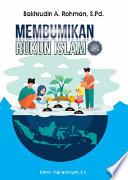Judul : Manajemen Risiko Pembiayaan UMKM Implementasi pada Lembaga Keuangan Syariah Penulis : Sunaryono, S.E., M.M., Devi Wahyuningsih, S.E., M.Ak, Tia Apriani, S.E., M.Ak, Dr. Fransiska Ekobelawati, S.E., M.M, Nurasiah, S.E., M.M, Nindy Puspitasari, S.E., M.Ak, Yulianto, S.E., M.M, Sukma Febrianti, S.E., M.M, Feriansyah, S.Sos., M.M, Ema Trisnawati, S.TP., M.M, Nurul Septya Magisa, S.Ak, M.M, Yusron Toto, S.E., M.M Ukuran : 15,5 x 23 cm Tebal : 168 Halaman Cover : Soft Cover No. ISBN : 978-623-10-1793-2 No. E-ISBN : 978-623-10-1794-9 (PDF) SINOPSIS Buku “Manajemen Risiko Pembiayaan UMKM: Implementasi pada Lembaga Keuangan Syariah” menawarkan panduan komprehensif untuk memahami dan mengelola risiko yang terkait dengan pembiayaan usaha mikro, kecil, dan menengah (UMKM) dalam konteks keuangan syariah. Dengan menggabungkan teori dan praktik, buku ini membahas berbagai strategi dan alat yang dapat digunakan oleh lembaga keuangan syariah untuk memitigasi risiko, sambil tetap mematuhi prinsip-prinsip syariah. Melalui berbagai studi kasus dan contoh nyata, pembaca diajak untuk melihat bagaimana konsep-konsep ini diterapkan dalam situasi dunia nyata, memberikan wawasan berharga bagi para praktisi keuangan syariah dan manajer risiko. Selain itu, buku ini juga mengeksplorasi peran penting lembaga keuangan syariah dalam mendukung pertumbuhan dan stabilitas UMKM. Dengan pendekatan holistik, penulis membahas bagaimana lembaga ini dapat menyeimbangkan antara kepatuhan syariah dan kebutuhan bisnis, serta bagaimana manajemen risiko yang efektif dapat meningkatkan kinerja dan keberlanjutan UMKM. Dilengkapi dengan analisis mendalam, framework, dan rekomendasi praktis, buku ini menjadi sumber daya penting bagi siapa saja yang terlibat dalam sektor keuangan syariah dan ingin mengembangkan pemahaman yang lebih baik tentang manajemen risiko dalam pembiayaan UMKM
-
ISBN 13 : 6231017931
-
ISBN 10 : 9786231017932
-
Judul : Manajemen Risiko Pembiayaan UMKM Implementasi pada Lembaga Keuangan Syariah
-
Pengarang :
Sunaryono,
S.E.,
M.M.,
Devi Wahyuningsih,
S.E.,
M.Ak.,
Tia Apriani,
S.E.,
M.Ak.,
Dr. Fransiska Ekobelawati,
S.E.,
M.M.,
Nurasiah,
S.E.,
M.M.,
Nindy Puspitasari,
S.E.,
M.Ak.,
Yulianto,
S.E.,
M.M.,
Sukma Febrianti,
S.E.,
M.M.,
Feriansyah,
S.Sos.,
M.M.,
Ema Trisnawati,
S.TP.,
M.M.,
Nurul Septya Magisa,
S.Ak,
M.M.,
Yusron Toto,
S.E.,
M.M.,
S.E.,
M.M.,
Devi Wahyuningsih,
S.E.,
M.Ak.,
Tia Apriani,
S.E.,
M.Ak.,
Dr. Fransiska Ekobelawati,
S.E.,
M.M.,
Nurasiah,
S.E.,
M.M.,
Nindy Puspitasari,
S.E.,
M.Ak.,
Yulianto,
S.E.,
M.M.,
Sukma Febrianti,
S.E.,
M.M.,
Feriansyah,
S.Sos.,
M.M.,
Ema Trisnawati,
S.TP.,
M.M.,
Nurul Septya Magisa,
S.Ak,
M.M.,
Yusron Toto,
S.E.,
M.M.,
-
Kategori : Business & Economics
-
Penerbit : Penerbit Adab
-
Bahasa : id
-
Halaman : 168
-
Google Book : https://play.google.com/store/books/details?id=1jEtEQAAQBAJ&source=gbs_api
-
Ketersediaan :
... Management . IEEE International Conference On Big Data , 1143-1152 Hakim , A. R. ( 2022 ) . “ BSI Salurkan ... Islamic Law , Islamic Finance , and Sustainable Development Goals : A Systematic Literature Review . Sustainability , 15 ...










